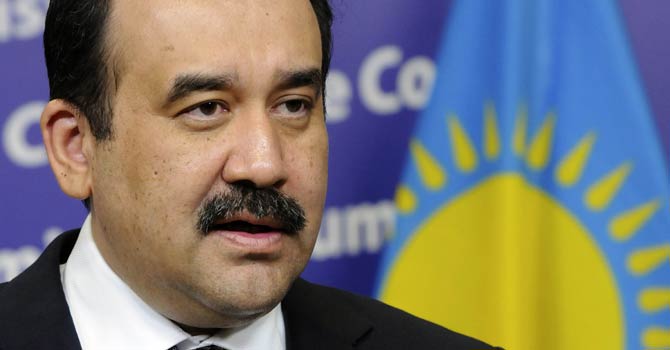
Macroeconomic Problems Overshadow Foreign Policy Agenda—A Net Assessment of the Situation in Kazakhstan Since the Start of 2014
Publication: Eurasia Daily Monitor Volume: 11 Issue: 183
By:

The past nine and a half months of 2014 have been dominated in Kazakhstan by the worsening macroeconomic situation, which has prompted the government to move forward with some unpopular measures while embarking on a set of far-reaching reforms. In February, the National Bank of Kazakhstan announced a 20-percent devaluation of the domestic currency, the tenge, which was previously devalued by a quarter in early 2009 at the height of the global financial crisis (tengrinews.kz, February 11). Rumors about a new devaluation had actually been circulating in the country since the summer of 2013, but the government repeatedly brushed them aside as “irrelevant,” instead praising Kazakhstan’s macroeconomic stability.
One year ago, in October 2013, the shutdown of the giant oil deposit at Kashagan, located offshore in Kazakhstan’s sector of the Caspian Sea, was widely evaluated by local observers as a bad sign for the authorities. While it was initially expected that commercial production could be reestablished by the end of 2014, the Ministry of Economy finally acknowledged this April that Kashagan might stand idle until at least early 2016. In the same month, President Nursultan Nazarbayev accepted the resignation of his prime minister, Serik Akhmetov, whom he had picked in September 2012, only to replace him with his predecessor, Karim Massimov (kapital.kz, April 2). The latter had earlier led the government in difficult times between 2007 and 2012, as Kazakhstan was trying to weather the consequences of the global economic meltdown, including a drastic fall in industrial production.
It is unclear whether Akhmetov was relieved of his duties because of the dire situation at Kashagan. But this explanation cannot entirely be ruled out. Bringing Massimov back to the prime minister’s office from the presidential administration could be a means for Nazarbayev to better defend Kazakhstan’s posture vis-à-vis foreign members of the North Caspian Operating Company (NCOC), which is developing Kashagan. In October 2008, the Massimov cabinet successfully negotiated a series of amendments to the 1997 production-sharing agreement, under which the NCOC has been obliged to bear 100 percent of the costs necessary to restart oil production, should the consortium fail to launch it by October 1, 2013. Thus, while the Kazakhstani government waits impatiently for Kashagan to be kick-started, it at least does not have to foot the bill for the replacement of damaged pipelines, estimated at over $2 billion (dnews.kz, January 16).
Unsurprisingly, Massimov’s return to the top of the government and the little time he has had since then to bring about positive macroeconomic changes have been insufficient so far to turn the tide as quickly as some initially expected. Kazakhstan’s GDP growth plummeted in the first half of 2014 to 3.9 percent, down from 5.1 percent in January–June 2013, owing to the simultaneous effect of neighboring Russia’s economic slowdown and the increasingly volatile international oil price. In response to these negative developments, the government drafted, the parliament voted for, and the president endorsed in mid-June a new law aiming to ensure better protection of foreign investors’ business interests. For foreign companies involved in the implementation of strategic and socioeconomically sensitive projects, the newly adopted law notably guarantees corporate and land tax exemptions of up to ten years, stable long-term fiscal rates for other taxes, investment subsidies, as well as the right to hire a foreign workforce without permits (zakon.kz, June 12).
So far this year, given the urgency of improving the macroeconomic fundamentals, foreign policy has remained largely on the sidelines of domestic politics. However, on May 29, Kazakhstan hosted a high-level meeting in Astana, attended by President Nazarbayev and his Russian and Belarusian counterparts, Vladimir Putin and Alyaksandr Lukashenka. The three presidents signed the founding treaty of the Eurasian Economic Union (EEU), which is set to replace, as of next January, the trilateral Customs Union, in force since July 2010. After Kazakhstan was clearly caught off guard by Russia’s annexation of Crimea in March and its continued support of the rebels fighting government forces in eastern Ukraine, it has since sided against its own will with Moscow, implicitly recognizing the fake referendums first in Crimea and then in Donetsk and Luhansk provinces (akorda.kz, May 29).
Yet, the deepening standoff between Russia and the West can hardly leave the Kazakhstani authorities completely unmoved. Russia currently remains Kazakhstan’s second-largest trading partner behind China and controls most of the trade with its northern regions. Moreover, Kazakhstani oil has historically been exported to foreign markets via Russian-controlled routes such as the Caspian Pipeline Consortium (CPC). In fact, there are growing fears in Astana that the sectoral sanctions imposed by Western countries upon Russia’s energy sector could hit Kazakhstan’s hydrocarbon industry, thereby putting an additional strain on the country’s efforts to reestablish economic growth at a level above 6 percent per year (vz.ru, October 14).
Although there is pretty much no chance that Kazakhstan might attempt during the last two and a half months of 2014 to reconsider its partnership with Russia and Belarus within the EEU, it has already shown some signs of its willingness to actively re-engage in a more multi-vector foreign policy. On October 9, Nazarbayev met in Brussels with the outgoing chairman of the European Commission, José Manuel Barroso (newtimes.kz, October 9). They proudly announced the finalization of bilateral (Kazakhstan–European Union) talks for the signing of an enhanced partnership and cooperation agreement (PCA). Kazakhstan will be the first country in Central Asia to have successfully negotiated this type of accord. Furthermore, Astana seeks to join the World Trade Organization (WTO) as soon as possible and needs Western support to overcome the remaining obstacles. Therefore, Astana can be expected over the coming months to cautiously seek increased relations with partners beyond Russia.




